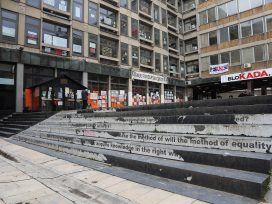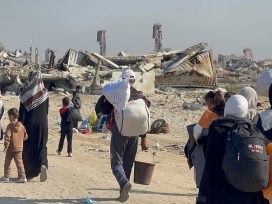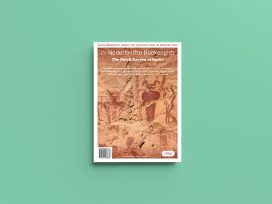Interview with Yassin al-Haj Saleh
‘The Syrian tragedy cannot be summed up simply as the murder of hundreds of thousands of human beings; it also involved the denial of any meaning to the extreme suffering of the Syrian people.’
‘The Syrian tragedy cannot be summed up simply as the murder of hundreds of thousands of human beings; it also involved the denial of any meaning to the extreme suffering of the Syrian people.’
Cultural humanitarian aid risks diminishing the complexity of creative work to ethnic kitsch: well-meaning initiatives rate nationality over content. And when the work does receive critical attention, only art that portrays trauma cuts it. Soon thereafter, Western interest fades. Could answers for meaningfully decolonizing Ukraine lie with other formerly colonized communities?

Should sexual relationships, with all their complications, really be a benchmark of societal acceptance? Vox Feminae investigates the history of asexuality and aromanticism: pathologized by psychologists and medical professionals, even at times minoritized within LGBTQIA+ communities.

The Serbian student movement symbolizes a generational shift and national renewal. For the first time in years, people are seeing a future for themselves and their children.

Second-wave feminist concerns over violence to women led to intense disagreement over pornography. For some, sexually explicit content was inherently abusive. Others explored the potential of what became sex positivity. Vox Feminae charts the emergence of US lesbian BDSM magazines from the late 1970s.

The decisive sex-change moment in movies, revealing a dramatic transformation, is far from reality. Transgender people face not only long assessment and surgery waiting lists but also bureaucratic hurdles when reassigning legal gender across countries, undermining their well-being and safety at a delicate time of becoming themselves.

With geopolitical deadlock and the widening of the conflict, prospects of an end to Israel’s destruction of Gaza are as distant as ever. But momentum for a ceasefire, and even statehood, would likely be stronger were Palestinian political factions not themselves still divided.

“Come Together” is founded on the principles of partnership and peer-to-peer learning among individuals within community media organizations situated in six different countries. Instead of generating entirely new knowledge, the initiative aims to unearth and leverage the existing wisdom residing within these organizations to foster innovative approaches.

Vikerkaar on why grey rhinos are riskier than black swans when it comes to epochal crises; how the Estonian government averted a crisis of state by crushing fascism in 1934; and why Estonia’s AI enthusiasm may provoke a crisis of education.

Thirty years on from the Srebrenica massacre, how The Netherlands has failed to acknowledge the ‘moral truth’ of the victims. Also: perspectives on the fascism debate; and why society needs a conversation about dying.

Borders and boundaries in the Soviet order: How the rhetoric of borderlessness hid imperial practices. Also: filmmaker Andrei Konchalovsky and the metaphysics of oil; and Andrei Sinyavsky’s literature of delinquency.

The European Parliament elections on 9 June are a referendum on EU policy since 2019. Will voters give Europe the green light for further progress, or pull the brakes? A new Eurozine series measures the political atmosphere in the EU and its neighbourhoods at this crucial moment.

Food and water systems under pressure: as the end of abundance becomes an everyday experience in Europe, we are thinking more closely about how our food reaches the table.

Post-revolutionary Ukrainian society displays a unique mix of hope, enthusiasm, social creativity, collective trauma of war, radicalism and disillusionment. With the Maidan becoming history, the focal point ‘Ukraine in European Dialogue’ explores the new challenges facing the young democracy, its place in Europe, and the lessons it might offer for the future of the European project.

Some observers, recalling the disasters of the 1920s and 30s, are suggesting that an anti-democratic counterrevolution on a global scale has begun. But is the writing really on the wall? Or does declinism prevent us from recognizing moments of democratic renewal?